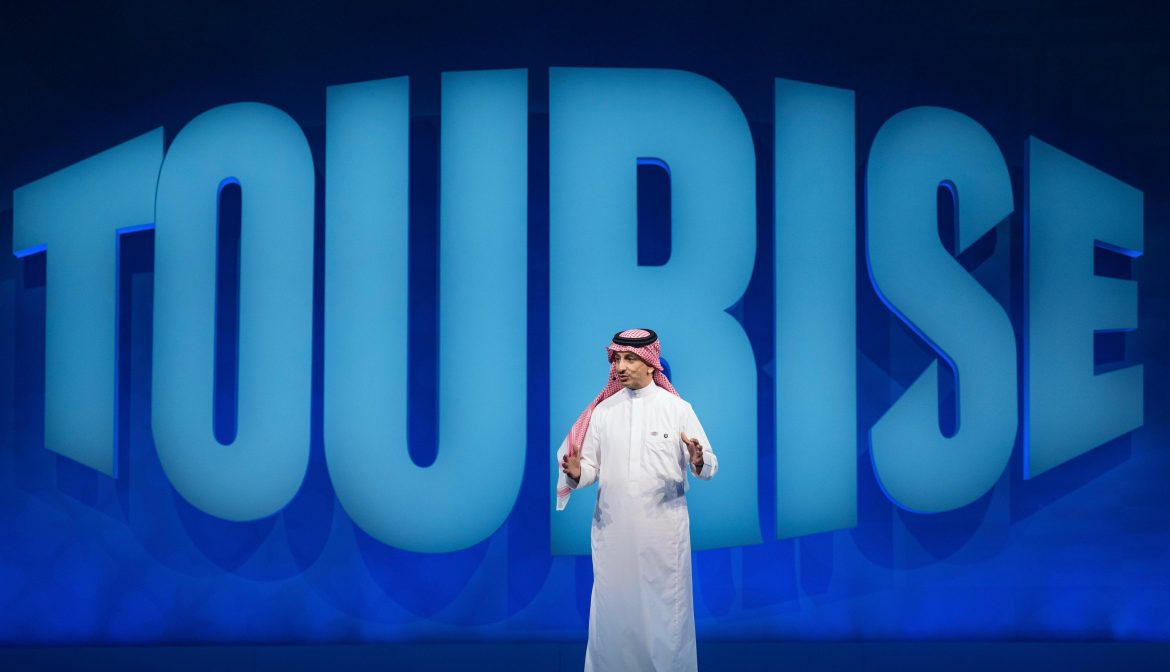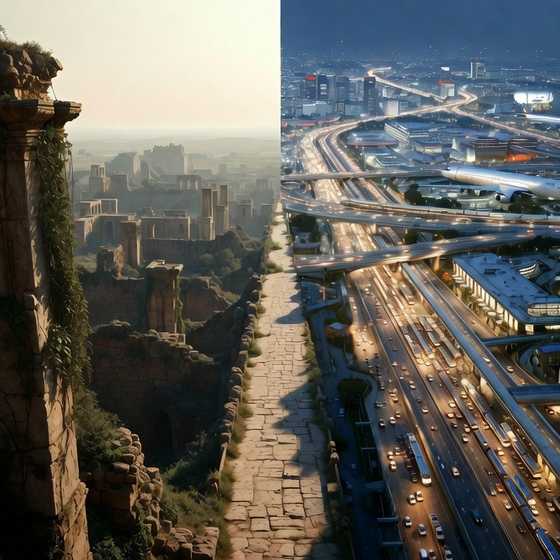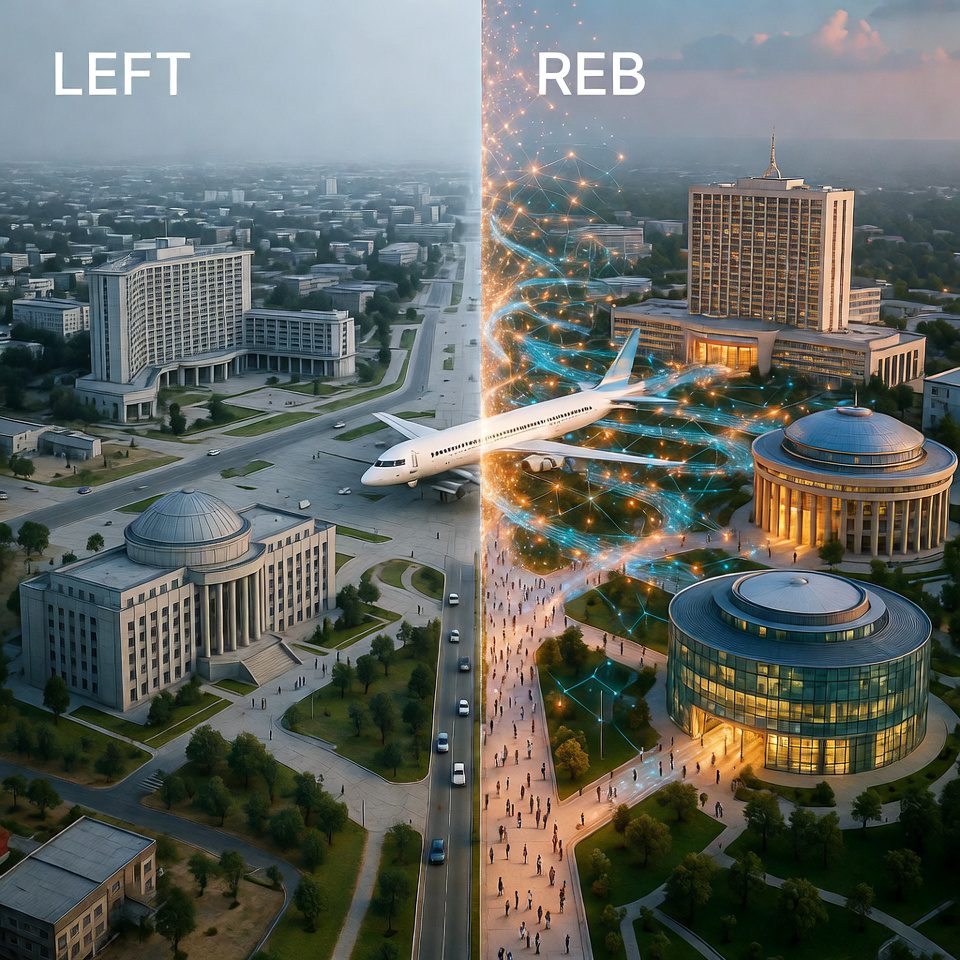Tourism’s Future
🎯 The Moment Everything Shifts
Picture this: You walk into a room. A hotel owner sits across from an airline CEO. Next to them? A tech entrepreneur chatting with a government minister. A community leader speaks up. An investor listens—really listens. Nobody’s defending their turf. Nobody’s competing for dominance.
Sound impossible?
On November 11, 2025, in Riyadh, it stopped being impossible. Nearly 8,000 people showed up. 140 speakers. People who’ve been competing for fifty years decided to do something radical: they started working together.
Not talking about cooperation. Actually doing it.
This is TOURISE. And it changes everything about how tourism works.
Let’s Be Real About What’s Broken
Tourism is doing okay. Growing, actually. But it’s broken in ways nobody talks about.
The numbers tell the story:
A $2.4 trillion industry post-pandemic. Sounds massive, right? But 40% of travelers can’t reach emerging destinations. Why? Because hotels, airlines, governments, and tech companies are solving different puzzles.
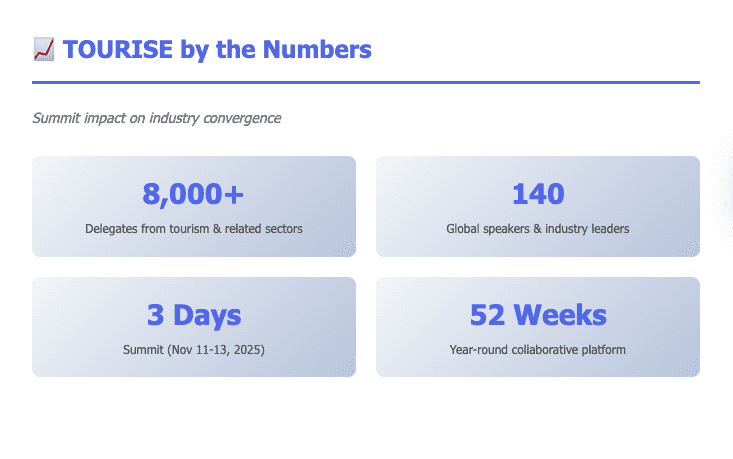
Investment money flows everywhere except where it matters. Hotels get funding. Destinations starve. Investors chase returns. Communities get left behind. The system works, but it works against itself.
We built technology to complicate things. Travelers book on 15 platforms. Each one optimized for the platform, not the person. Frictionless borders? Still a dream. Seamless experience? Fragmented across dozens of systems.
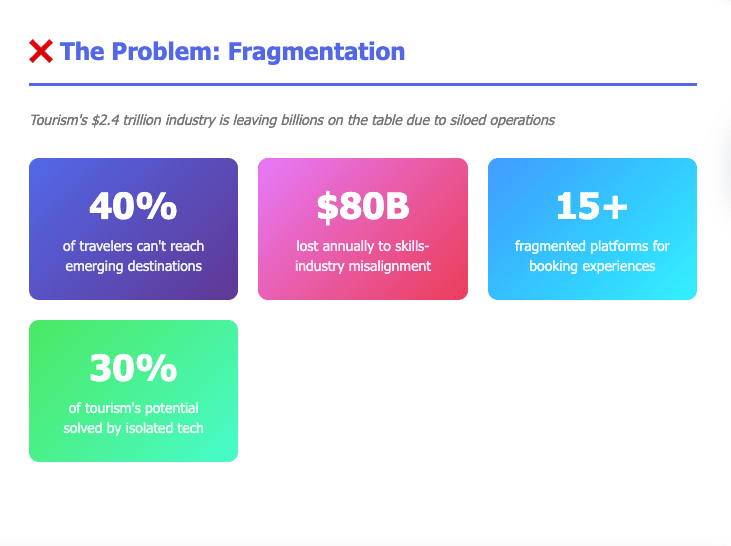
Skills gap costs the industry $80 billion annually. Training programs don’t know what businesses need. Businesses don’t know what talent’s available. Everyone’s guessing.
Sustainability commitments everywhere. Real progress? Nowhere. Every hotel claims green credentials. Every airline promises carbon-neutral travel. Without coordinated frameworks, these are just marketing claims.
Here’s the uncomfortable truth: The problem was never innovation. It was isolation.
Everyone solved their piece. Nobody solved the puzzle.
🔄 Then TOURISE Happened: What Actually Changed
What if the real barrier wasn’t competition—it was conversation?
That’s the insight behind TOURISE. It’s not another conference where people talk about problems. It’s a platform where the people who create problems sit down and decide to solve them together.
Here’s what shifted:
Before TOURISE, authority was simple. Ministers made rules. Industry followed. Travelers accepted. Hotels competed on features. Airlines competed on routes. Tech competed on speed. Everyone optimized their corner, ignored the bigger picture.
That system was always going to break. Complex problems need complex solutions. Siloed thinking can’t solve integrated challenges.
TOURISE flipped the script. Authority doesn’t flow down anymore. It emerges from collaboration.
When a booking platform CEO listens to what tourism actually means to a village community. When that same person then talks strategy with a government official and an investor—and all three realize they’ve been chasing the same goal from different angles. The old game stops making sense.
You don’t earn your seat at this table by dominating your sector. You earn it by understanding how your sector connects to the whole ecosystem.
That’s the real shift. And once it starts, you can’t stop it.
Imagine Your Biggest Competitor Becomes Your Partner Tomorrow
Three unstoppable forces are colliding right now:
Technology moves faster than policy can keep up. AI, real-time data, automation—tools exist to solve tourism fragmentation tomorrow. But only if everyone points them in the same direction. Right now? Everyone’s using them separately. TOURISE creates alignment. Suddenly, technology actually solves problems instead of creating new ones.
Travelers changed. The industry didn’t notice yet. Today’s traveler wants three things simultaneously: smooth experience, real connection, positive impact. These sound conflicting. They’re not. They need each other. You can’t deliver one without the others. That requires integration from day one, not as an afterthought.
The world’s becoming more fragile. Climate change, geopolitics, resource scarcity—tourism can’t afford fragmentation anymore. Resilience comes from alignment. Destinations that bring everyone to one table? They survive disruption. Those operating in isolation? Vulnerable.
The timing isn’t random. TOURISE arrived exactly when the industry figured out something fundamental: collaboration isn’t soft strategy. It’s survival.
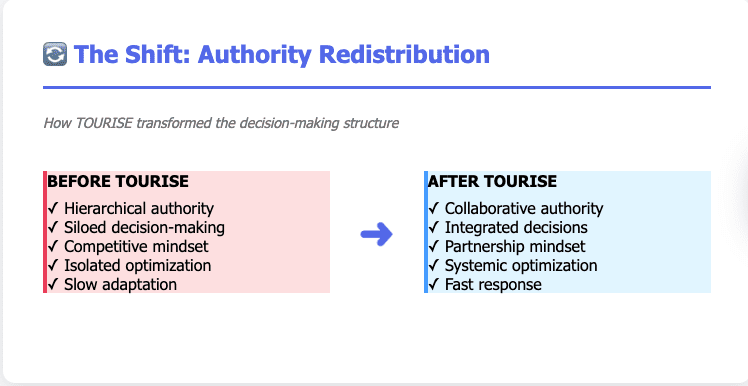
💼 So Who Actually Decides Now?
Here’s what’s genuinely revolutionary about TOURISE: Nobody controls everything. Everyone owns something bigger.
Travel professionals aren’t taking orders from one authority anymore. They’re writing the rules alongside peers from other sectors. Your hotel strategy now connects directly with tech infrastructure and government policy—in real-time, together.
Governments realized something: You can’t make policy in a vacuum. Smart policy emerges when you understand how businesses actually operate, what investors genuinely need, what communities truly require. TOURISE creates that conversation.
Tech investors stopped betting on isolated innovations. They see that fragmented tech solves 30% of problems. Integrated tech? That solves 80%. Money naturally flows toward systemic solutions.
Destination marketers aren’t competing as isolated brands anymore. They position themselves as nodes in integrated networks. A destination’s value isn’t just what it offers—it’s how it connects to the entire ecosystem.
The shift is profound: Authority didn’t disappear. It redistributed. Everyone lost control of their isolated kingdom. Everyone gained responsibility for something much bigger.
And honestly? That’s way more powerful.
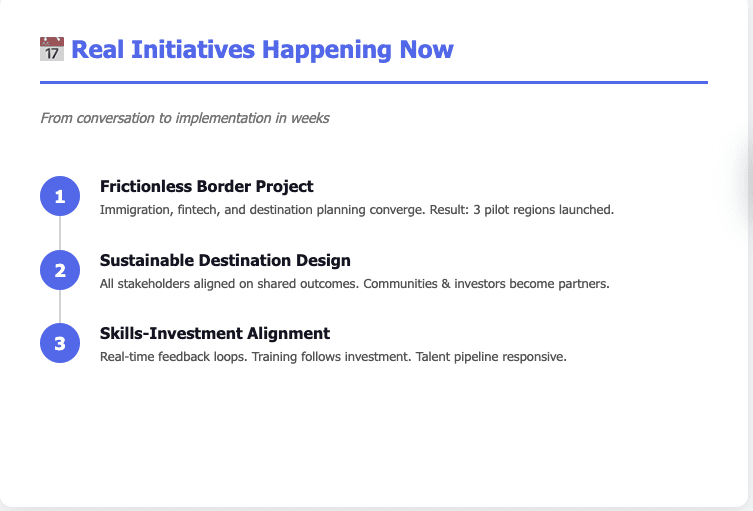
🎯 What’s Actually Happening Right Now
This isn’t theoretical. Real pilots are running:
The Frictionless Border Initiative
An immigration officer, a fintech entrepreneur, and a destination marketer had a conversation at TOURISE. They realized: Frictionless travel isn’t about removing borders. It’s about pre-intelligent systems. When immigration, banking, and destination planning integrate, friction disappears naturally. Authority shifts from “border control” to “traveler enablement.” Result? Three pilot regions launched. Conversation to operation in weeks.
Sustainable Destination Design
Government wants sustainability. Communities need jobs. Hotels want occupancy. Investors want returns. Normally these conflict. At TOURISE, someone asked: What if we designed destinations where all four feed each other? Sustainability creates jobs. Jobs attract investment. Investment improves infrastructure. Infrastructure enables experiences. Authority became distributed across all stakeholders. Communities aren’t fighting investors anymore—they’re partners.
Skills-Investment Alignment
For years: investors complaining about talent shortages. Trainers complaining about unclear needs. Real disconnect. TOURISE created real feedback loops. Training programs now follow investment flows. Authority over skills development became collaborative, not institutional. Talent pipeline went from broken to responsive.
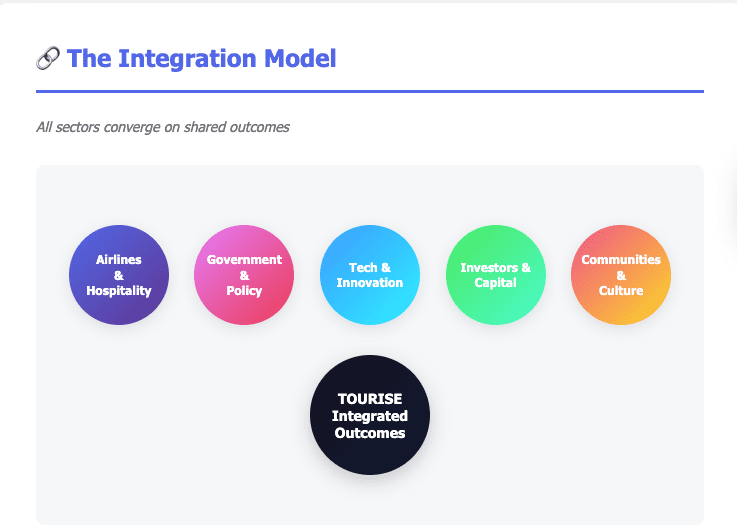
❓ Questions Everyone’s Actually Asking
Q: TOURISE is just a three-day conference that’ll disappear, right?
A: No. The November summit is day one. TOURISE is “physically exclusive, digitally inclusive, and year-round.” The real work—implementation, partnerships, ongoing collaboration—that’s the actual TOURISE. The summit just ignites it.
Q: Who actually decides things? Someone must have final authority.
A: Decisions emerge from sector consensus. Not majority votes. Not hierarchical approval. If policymakers, industry, investors, and communities can’t align, the initiative isn’t ready yet. Sounds slow? It actually isn’t. When everyone owns a decision, implementation moves fast because there’s no internal resistance.
Q: Won’t I lose competitive advantage if everyone has the same information?
A: Competitive advantage shifts from information hoarding to execution excellence and customer obsession. TOURISE levels the information playing field. But execution? Culture? Innovation? Those remain differentiators. Better operators win. Better gatekeepers don’t.
Q: Can smaller destinations actually participate, or is this just for major players?
A: TOURISE is “digitally inclusive” specifically to enable emerging players. A small destination’s insight might spark the next billion-dollar opportunity. Authority isn’t based on size anymore—it’s based on contribution to the integrated system.
Q: How do I know this actually delivers, not just promises?
A: TOURISE Awards already recognize destinations exemplifying excellence. Working groups are implementing real initiatives. Ministerial dialogues are producing concrete outcomes. Proof comes through delivered results, not conference speeches.
Q: What’s specifically in it for my organization?
A: That depends on your role. Industry professionals gain direct access to government and investor insight plus collaborative partnerships. Policymakers get real-world data on what works. Investors identify systemic opportunities with lower risk. Destination marketers position their communities as integrated nodes, not isolated brands. Everyone gains differently.
Q: How long before actual changes happen?
A: Changes are already happening. TOURISE created frameworks in November that are being piloted immediately. Some shifts take months (technology). Others take years (policy). But direction is set and momentum is irreversible.
The tourism industry’s authority structure just shifted
A traveler books an experience, not just a hotel. That experience was designed by hoteliers, airlines, tech platforms, local governments, communities, and investors—all aligned on one outcome: the traveler’s success.
Infrastructure investment flows toward systemic improvement, not isolated upgrades. Sustainability isn’t a brand claim anymore—it’s built into every layer because all stakeholders benefit from it.
Skills development happens in real-time. Education and industry aren’t on different timelines—they’re in constant dialogue.
Emerging destinations don’t lose to established brands. They compete on unique integration models. A small community that aligns its government, local businesses, tech partners, and investors becomes more attractive than a sprawling destination with siloed players.
Tech serves tourism, not the other way around. AI understands entire systems, not isolated data points. Digital borders vanish not because governments disappear, but because they work seamlessly with all other stakeholders.
This isn’t utopian. It’s systemic. It’s how complex industries actually survive disruption.
Results Over Promises
Cooperation Over Competition
Tourism spent fifty years growing by fragmenting itself. Everyone specialized. Everyone optimized their corner. The industry expanded.
But size and potential are different things.
The next fifty years belong to whoever integrates those pieces. Not merges them. Integrates them. Brings them into conversation. Aligns them around shared outcomes.
TOURISE isn’t setting the rules anymore. TOURISE is teaching the system how to write its own rules together.
The question isn’t “Who sets the rules now?”
The real question is: Are you ready to help write them?
Because there’s space for you at the table. And the conversation’s already started.

